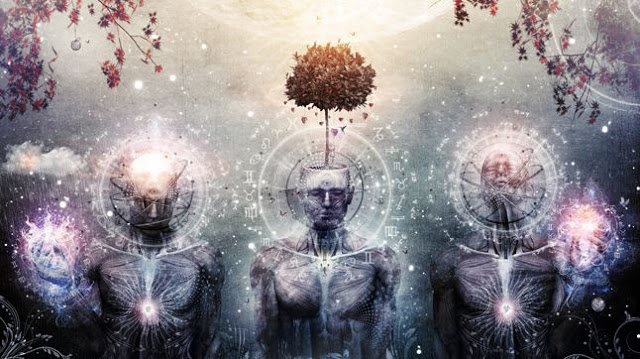

| Online: | |
| Visits: | |
| Stories: |
Involution; Inner Transformation and Self-Exploration
by Mateo Sol; Loner Wolf
“Know Thyself” was written over the portal of the antique world. Over the portal of the new world, “Be Thyself” shall be written. ~ Oscar Wilde
“Know Thyself” often ascribed to the Greeks, is in fact, at the root of most ancient spiritual teachings.
Jesus Christ said: “Neither shall they say, Lo here! or, lo there! for, behold, the kingdom of God is within you.” The first antipope Hippolytus of Rome quoted the same message, first uttered by the Gnostic teacher Monoimus: “Abandon the search for God . . . instead, take yourself as the starting place.”
Roman Emperor Marcus Aurelius once spoke: “Be Thyself!” But the question still remains … how can we be ourselves? We barely know ourselves! How can we know where we are going unless we know where we are first?
Journey to the Center of Your Being
If most of us remain ignorant of ourselves, it is because self-knowledge is painful and we prefer the pleasures of illusion. ~ Aldous Huxley
Our external worlds have evolved at an amazing rate but internally, we are not much better off than people a few hundred years ago. Sure we know more about the biology of the brain, are somewhat more empathetically humane and have developed many psycho-analytical systems but most of us know ourselves very superficially.
In reality, we only skim the surface of our identities, we don’t truly dig deeply and analyse our thoughts, feelings, social conditioning’s, habits, ego, desires and dreams.
Finding a Path With Heart
How little do we know that which we are! How less what we may be! ~ Lord Byron
Joseph Campbell offered a guide to living a meaningful and joyful life that can be summarized with his phrase “Follow your bliss”, to find a path in life “…that has been there all the while, waiting for you, and the life that you ought to be living is the one you are living. Wherever you are — if you are following your bliss, you are enjoying that refreshment, that life within you, all the time.”
To find this path, to improve your happiness, you must learn to listen to yourself; listen to the true you, so you can liberate yourself from the false ‘you’ that has been influenced by all the ambitions, pursuits and beliefs that your family, friends and culture has imposed upon you. To find a path with heart is to listen to a very subtle voice in the background, a feeling behind all the noise that your thoughts and ego make.
This voice can only be heard the more you learn to trust and love yourself by listening less to the false personality you carry around with you. Before we can gain Self-Love, however, we must first develop Self-Knowledge, otherwise who are we going to love? If you don’t know who you are, you’ll make the mistake of loving your false personality.
The first step to learn to discover, understand, accept and love ourselves is to find out; who we are, where we are, and why we are the way we are. For the answers to this we must begin our journey of Self-Knowledge.
How to Self-Explore
Knowledge of thyself or Self-Knowledge is an infinitely vast, vague and distant pursuit. It is easier to first strive for something simpler like Self-Exploration.
Self-Exploration or Self-Study is a much more attainable goal, and eventually leads to accumulating knowledge of oneself. This is why this particular level of Involution is known as Self-Exploration and not Self-Knowledge.
In order to start this path, you must first find the right methods of how to study yourself and where to begin. Typically our attention flows exclusively outward to the external object we are considering, be that a person, or a thing.
In the process of Self-Exploration, we are developing the ability to divide our attention; to simultaneously be aware of both our inner selves (our conscious self-awareness) and what we are outwardly considering (be that an external object or internal thought/feeling/instinct).
There are two principal methods to do this, each offering different techniques to accomplish them.
Self-Observation
The first method is a passive one, that of simply ‘registering’ or ‘recording’ our observations. In this practice you are a watcher, you contemplate all that is happening within you without judgement or questioning. You remember all that ‘happens’ within you, where it comes from, how it arises, why it arises.
Some useful techniques of Self-Observation are:
- Meditation: By far the most popular technique to observe yourself, it works by dedicating a specific moment of the day to take time out, to find a relaxing quiet place, and requires you to focus your attention away from your thoughts/feelings by using one of many mantras (from the Sanskrit words ‘Man‘ meaning Mind and ‘Tra‘ meaning Instrument).
- Mindfulness: Mindfulness is in fact a part of meditation, but a less formal process. It’s been proven scientifically to help us learn about our true selves. Mindfulness can be applied anywhere at any time. In essence, it is paying attention to the present moment purposefully, with intent and without any judgement or resistance towards it. This awareness with intent provides immense clarity, and acceptance of present-moment reality. We become aware that our lives only unfold in moments.
- Alternate States Of Consciousness: Trance states of consciousness are states where we become detached from our sense of ‘self’ making us more objective in our self-exploration by removing subjective inhibitions. It works by slowing down our minds (where our fake socialized personalities exist) so we can step out of it and into our bodies to experience our deeper energies and become more in touch with our being, heart and essence. From hypnosis, sensory deprivation, rapid hyperventilation and even exhaustive tribal dancing, many techniques can be used as catalysts to achieve this process.Historically though, one of the most effective ways to enter these states was through the consumption of psycho-active substances such as Psylocibin (found in certain species of mushrooms), DMT (used commonly in Ayahuasca brews) and Mescaline (often found in the Peyote and San Pedro cactus). The attraction to this technique is the ability to immediately experience this sense of wholeness or interconnectedness. The consumption of psycho-active substances was also used in many Self-Exploration spiritual schools as a way of providing a look ahead, as a way of providing a taste of what could be experienced naturally through prolonged work (for example, much evidence has been found of its use in Hindu spiritual teachings and even in Platonic Greece in yearly held rituals). As a paqo trained by the Q’ero shamans I advise against this particular method, as it requires proper guided initiation and can easily become a crutch or distraction for the unprepared.
Self-Analysis
A more popular approach in the scientific East is using psychoanalysis. Personally I find Self-Analysis to be an excellent complimentary method to practicing Self-Observation, which, to me, should be used only after one has observed themselves enough and has a deeper understanding of their inner workings.
Some of the techniques available for the Self-Analytical method include:
- Introspection: This involves inwardly contemplating your thoughts, as well as exploring why you do what you do, and why you think what you do. Introspection is an essential instrument in the goal of achieving Self-Knowledge, and allows us to more deeply understand our strengths and weaknesses. It allows us to not only feel that we’re on a ‘path with a heart’, but also allows us to also go beyond the abstract thoughts and feelings inside of us and understand why.
- Psycho-analysis: Psychology is an extremely effective system for the treatment of many neurotic thoughts and habits. There are many schools of psychology from Freud’s to Transactional Analysis. Finding the right system that works for you is essential as each neurotic problem varies from person to person. The only problem is that psychology can only take you so far, it can rid you from many of your neurotic perceptions of reality, but not provide you with a meaningful spiritual path to follow, for instance; it won’t change any of the culturally taught beliefs and ideas you have. And it won’t allow you to transcend your false self.
Trying to escape the mental thought labyrinth by thinking your way out of it won’t work. When you analyse yourself you will come across different phenomena and you will question it: “What is this? Why am I doing this?”
This question will send you on a quest for answers, you’ll search for more and more answers and become so engrossed in this search that you’ll completely lose the notion of Self-Observing yourself and ironically create another neurotic habit.
In the end, the key to your search for Self-Knowledge is balancing your Self-Exploration using Observation and Analysis.
About Mateo Sol
As a shaman, spiritual guide and soulwork teacher, my mission is to help you to grow, find your purpose, and experience true freedom in this life. Read More →
Every Day is Earth Day
Source: http://feedproxy.google.com/~r/riseearth/KZKa/~3/fzrlnOQ0I8Y/involution-inner-transformation-and.html




